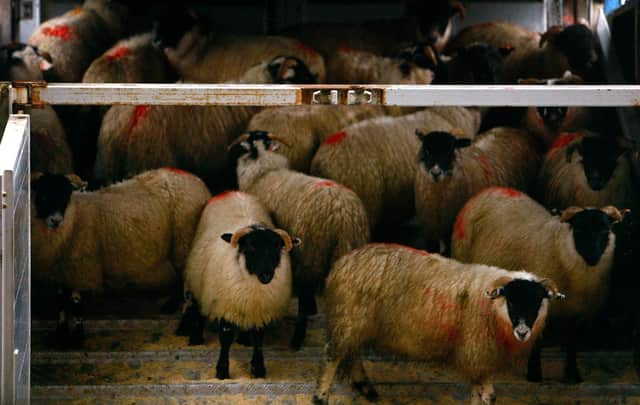Live animal export ban is a resolution the UK Government must keep – Philip Lymbery


So, how are your New Year’s resolutions going? For many of us, resolutions revolve around doing more exercise, saving money, or eating better. About a third of us set them, with people in Edinburgh, Liverpool, and London amongst the most enthusiastic. But how many good intentions have already fallen by the wayside?
It’s a tradition spanning four millennia since the days of ancient Babylon and was linked to the farming year. For them, the year began in spring with the planting of crops for the year ahead. Resolutions would be about repaying debt and returning borrowed farm implements. One of the timeliest resolutions with a farming theme this year is by the UK Government: to ban live animal exports from Scotland, England, and Wales.
Advertisement
Hide AdAdvertisement
Hide AdIt’s been a long time coming. Decades in fact. And it is testimony to what I’ve always believed: that big change in society takes a generation to achieve. As citizen changemakers at local community or national level, we should take that as encouragement to keep going with our dreams. To not be put off by immediate barriers and frustrations.
Coffin-like veal crates
Thirty years ago, we were amidst popular protests against UK live animal exports, whereby over two million sheep, lambs and calves were sent on horrendously long journeys to other countries for slaughter or fattening. Calves often ended up in veal crates, tiny coffin-like boxes where they could never turn around for their entire life.
Now the UK Government has introduced a Bill to end live animal exports for slaughter or fattening forever. So, how is it going? Well, in what I took as a sign of governmental seriousness, I found myself invited to meet with the Prime Minister’s office to discuss plans for a ban. A further indication came when the proposed ban was quickly introduced into parliament.
Cause for Christmas cheer arrived when it passed a crucial hurdle, getting a successful second reading with all-party support. It prompted newsreader and presenter Selina Scott to predict in the Daily Mail that “by this time next year, happily, the abhorrent live export trade will have ended”. The good news is that no animals have been exported from Britain for slaughter or fattening since 2020.
Political consensus
But let’s be clear, that’s reason for celebration, not complacency. Left to its own devices, this cruel trade could well resume. Taking this opportunity to stop it once and for all is important to the British public.
Evidence of why action is needed is sadly close at hand; a new report reveals the true scale of the trade in the European Union. Some 44 million farmed animals every year endure needlessly long journeys, some lasting weeks at a time. The EU Commission has published proposals for reform, but these are worryingly weak.
In Britain, 30 years on since those nationwide protests, we have political unity on ending live animal exports, a trade that has long blighted British food and farming. We are now within touching distance of consigning it to the history books. Doing so is one resolution well worth seeing through.
Philip Lymbery is chief executive of Compassion in World Farming, a former United Nations Food Systems Champion and an award-winning author. His latest book is Sixty Harvests Left: How to Reach a Nature-Friendly Future. Philip is on Twitter @philip_ciwf
Comments
Want to join the conversation? Please or to comment on this article.
